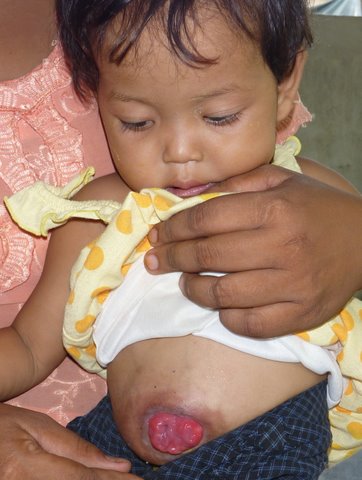Gastrointestinal Conditions

2-year-old Nway with her colostomy
Two of the most common conditions we treat at BCMF are Hirschprung Disease and Imperforate Anus.
- Hirschsprung Disease is a blockage of the large intestine due to improper muscle movement in the bowel. Muscle contractions in the gut help digested materials move through the intestine. Nerves in between the muscle layers trigger the contractions. In Hirschsprung’s disease, the nerves are missing from a part of the bowel. Areas without such nerves cannot push material through. This causes a blockage. Intestinal contents build up behind the blockage, causing the bowel and abdomen to become swollen. It is a congenital condition, which is normally treated with surgery where the abnormal section of the colon is removed. The healthy part of the colon is then pulled down and attached to the anus.
- Imperforate Anus is a birth defect in which the opening to the anus is missing or blocked. Some babies need time to grow before they can have surgery to correct imperforate anus. While waiting, these babies need a way for solid waste to leave their bodies. Doctors may perform a surgery called a colostomy so waste can leave the baby’s body. When the baby is older, reconstructive surgery is performed to create an anus and to reconnect the rectum to the newly formed anal opening.


